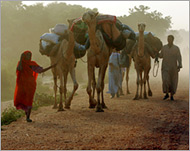Sudan leaders ‘had role in Darfur’
The Sudanese president, government figures and militia members should be investigated for ordering, condoning or carrying out atrocities in Darfur, a report says.

The 85-page report by Human Rights Watch, released on Sunday, documents through eyewitness accounts, government papers and its own investigations of their alleged role in committing war crimes and crimes against humanity in Darfur since mid-2003.
“The Sudanese government at the highest levels is responsible for widespread and systematic abuses in Darfur,” the report says.
“The Sudanese government’s systematic attacks on civilians in Darfur have been accompanied by a policy of impunity for all those responsible for the crimes.”
The report entitled “Entrenching Impunity: Government Responsibility for International Crimes in Darfur“, was prepared for use by the International Criminal Court, which the UN Security Council assigned in March to indict individuals responsible for the abuses.
Luis Moreno Ocampo, its prosecutor, addresses the council on Tuesday but has not yet ordered any indictments.
Sanctions
 |
|
The Janjawid are said to have |
In addition, the rights group said the UN Security Council should incorporate the list of names in its register of suspects eligible for sanctions. The council voted for the sanctions nine months ago but has taken no action.
Tens of thousands of Sudanese have been killed since a revolt in Darfur began in early 2003 by non-Arab villagers who accused the government of neglect and repression.
The report alleges that Khartoum armed Arab Janjawid militia in retaliation and drafted them into police and other security forces as they looted, raped and drove 2 million people from their homes.
The Khartoum government has for two years denied its affiliation with the Janjawid and set up its own courts to try suspects.
No effort
But Human Rights Watch, which is based in New York, said the government has made no “genuine” effort to investigate, discipline or prosecute those responsible.
 |
|
Taha was praised for negotiating |
One former soldier was quoted as telling Human Rights Watch that when he protested to his commander, he was told: “You have to attack the civilians.”
Although the Sudanese government probably does not have full control over all militia any longer, the report says the “out-of-control” state of affairs provides the government with the deniability it believes it needs to counter international protests”.
Presidential role
Omar al-Bashir, a lieutenant-general, who is also commander-in-chief of the army, played a pivotal role, the report says.
Also on the list is Ali Osman Taha, Sudan‘s vice-president, who has been praised for negotiating the north-south peace agreement that a year ago ended decades of civil war.
The report acknowledged that there was little documentary evidence concerning Taha. But it quoted community leaders who said he arranged for the release of Musa Hilal, a member of the Janjawid from prison in 2003.
They said that Hilal, also on the rights group list, took orders from Taha alone.